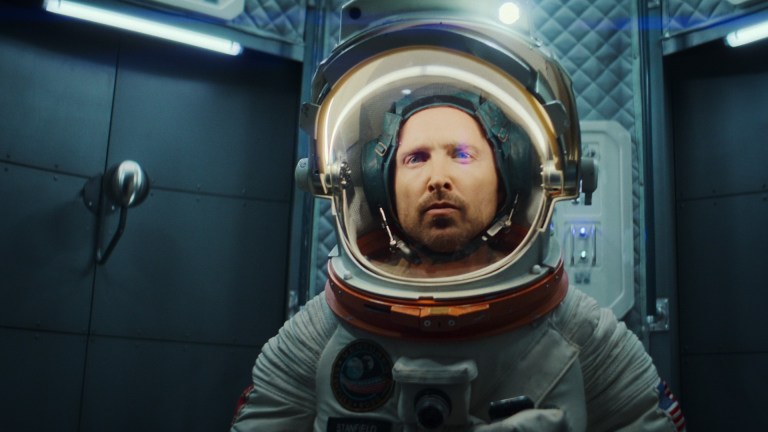Black Mirror: Why Beyond the Sea’s Divisive Ending Works
Toxic masculinity plays an important role in the shocking end to Black Mirror episode "Beyond the Sea."

This article contains spoilers for the Black Mirror episode “Beyond the Sea.”
The sixth season of Black Mirror is full of shocking twists, though few feel as emotionally devastating as the ending of the third episode of the season, “Beyond the Sea.” Set in an alternate 1969 with advanced space travel and the ability to shift consciousness to a robotic replica, this episode follows astronauts Cliff (Aaron Paul) and David (Josh Hartnett) two years into an important six year mission in deep space. When they aren’t tending to the needs of the space station, the two are able to return to Earth and spend time with their families through a robotic doppelganger of themselves.
After David’s family is killed by a cult and his replica is destroyed, he slowly loses his mind until Cliff offers to let him spend time on Earth through his replica. During his time on Earth in Cliff’s replica, David starts to become obsessed with Cliff’s wife Lana (Kate Mara), so much so that Cliff essentially revokes his body double privileges. This pushes David over the edge so much so that he fakes a malfunction that requires Cliff to exit the station so that he can use Cliff’s replica to murder Lana and their son Henry – forcing Cliff to live through a similar trauma to his own.
But this brutal ending isn’t just a commentary on trauma and the vast loneliness of space, it also serves as an argument against toxic masculinity. The reason this ending feels so unexpected and shocking is because most people wouldn’t think that David would force another human to go through the emotional pain he’s been going through in the months since his family’s brutal murder. Even Kate Mara and Josh Hartnett were surprised by the direction the ending of this episode took.
During a press junket, Mara said that she was “bummed” by the ending, even though she expected some sort of “crazy twist” in the episode. Meanwhile, Hartnett said about the “pitch black” ending that he “assumed [the episode] was going in one direction, and my assumption was pretty much shared by everyone that I’ve spoken to since and then it went in a different direction, which was even darker.” And yet, even though we don’t expect the episode to end so brutally, there are signs throughout the episode that this is how things will end for David and Cliff.
Toxic masculinity is generally considered to be a set of societal norms and guidelines that promote a “traditional” style of manliness and masculinity. It doesn’t mean that being a man is a bad thing, but rather that conforming to a rigid and limiting belief of what it means to be a man can have negative effects on those around you. Cliff and David both subscribe to this limiting belief in different ways, which isn’t a surprise for the time period this episode is set in. Even though this reality has developed the ability to transmit living consciousness across space and time, they apparently still don’t seem to think that men should talk about their emotions with each other or anyone else.
Cliff is shocked and almost appalled that David cried in front of Lana during his first time back on Earth, as if that’s not a normal human reaction to such a devastating loss. Even after the tragedy, Cliff and David rarely speak about it deeper than surface level conversations, and they definitely don’t talk about how David is actually feeling. Fresh air and painting can only do so much when a person is so depressed they almost throw themselves out of an airlock into the cold, unforgiving vacuum of space. That should have at least been one indication that David needed professional help. If NASA or whatever agency is behind this mission had simply thought to help David seek counseling for this trauma and the isolation that followed, even if he still had to do it through Cliff’s replica, maybe this whole thing could have been avoided.
This isn’t to say though that therapy would solve all of David’s problems. He and Cliff both still have very limiting, patriarchal ideas of what their roles in society are and how other people should treat them because of it. Even after the airlock incident, Cliff believes he can fix David on his own without help from the agency or other professionals, and doesn’t realize or care that he’s pushing the emotional burden of the situation onto his wife. He doesn’t seem to have a close relationship with his wife or his son either, treating them more like obedient housemates than people he loves and cherishes. Henry seems a little scared of him and Lana doesn’t feel “appreciated or seen” when she’s around Cliff, according to Mara.
David’s obsession with Lana doesn’t just stem from his tragic loss and his need for human connection, it also comes from the idea that he is owed whatever he wants because he’s a man. He draws Lana naked without her consent and he continues to force intimacy with Lana after she says no repeatedly. David thinks his apology to Cliff is enough to justify what he’s done, and that he’s owed the chance to say goodbye to Lana, but when Cliff essentially revokes his access to her as if she’s an object that can be taken away on a whim and not a human being, David murders her and Henry.
Neither David nor Cliff seem to be inherently evil people, but maybe if society encouraged men to express emotions other than anger, especially around each other, then David wouldn’t have felt the need to go to such an extreme place to get Cliff to understand what he’s been going through. “Beyond the Sea” may be set in an alternative 1969, but the attitudes of Cliff and David are very much alive today. And that’s likely what makes the ending of this episode so shocking. We don’t expect gendered traits and behaviors that we’re repeatedly told are “normal” to lead to such violence, but that’s sadly often the reality.
All episodes of Black Mirror season 6 are streaming on Netflix
